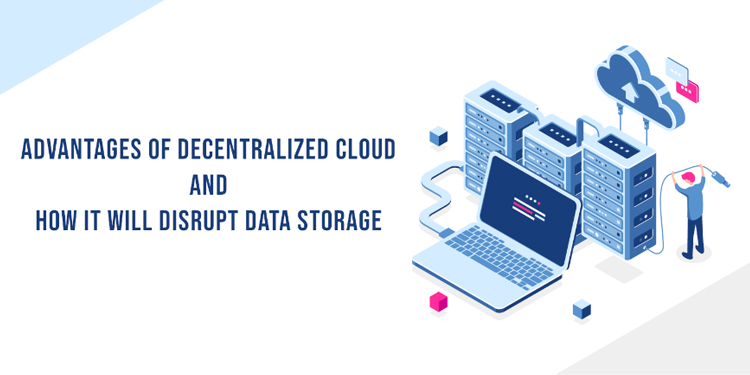The applications of blockchain technology are endless and among the variety of business verticals already utilizing the digital ledger to optimize business processes, data storage and cloud computing are set to evolve into one of the hottest blockchain use-cases in the next few years. From solving our challenges to store data securely over the internet to safeguarding our valuable information from monopolistic entities, the decentralized cloud is set to disrupt the data storage industry and guide us to even greater applications of blockchain technology.
What is Decentralized Storage?
Decentralization is the transfer of control of an activity or an organization to several authorities rather than a single one. Hence, as the name suggests, decentralized cloud storage is where data is distributed into encrypted fragments and stored on multiple decentralized storage nodes across the world rather than a centralized data server. The independent nodes are hosted by members of the community who are incentivized to participate via the network’s native $SRX token.
Advantages of Decentralized Cloud over Centralized Cloud
- More Secure – Since it is based on blockchain and the data is end-to-end encrypted, it ensures the security of the user’s sensitive data. Additionally, as it is based on a decentralized architecture, it eliminates any third-party roles that could make the data vulnerable.
- Greater Privacy – Since the data is sharded into encrypted fragments and stored across participating nodes, no one person will be able to access your data or manipulate it, unlike a centralized cloud where your data’s ownership including privacy and security is completely in the hands of the cloud provider.
- Cost-Effective – As decentralized cloud storage is driven by community members with potentially millions of nodes storing your data, it reduces the cost of storing data substantially. A decentralized cloud storage platform such as StorX Network allows its users to store data at a fraction of the cost of centralized cloud storage services.
- Faster Speeds – A traditional server can face time-consuming network bottlenecks if the traffic is more than the network can handle and overwhelm it. A decentralized cloud eliminates a central server and stores multiple copies of your data across multiple storage nodes thus increasing file retrieval and download speeds.
- Highly Redundant – Losing your important files is always a risk when you decide to store your data online. By storing your data across multiple storage nodes the single point of failure is eliminated and all of your data can be recovered even if most of the storage nodes go offline or fail to function due to uncontrollable reasons. Hence, you will always have a backup of your data at your disposal.
- Reliability – Data stored on a decentralized cloud is duplicated across multiple storage nodes across multiple geographical locations and this provides immunity over system-wide events such as power outages, system failures, or any hacks and data breaches that could compromise entire data servers.
- Open-Source – The software implemented in running a decentralized cloud is completely open-source and transparent. So there is no risk of fine-print clauses that could lead to a user losing control over their data.
- Higher Bandwidth – Due to the availability of multiple servers for downloads, the bandwidth is very high in decentralized cloud storage.
- Environment Friendly – A decentralized cloud is greener compared to its centralized counterparts as it utilizes unused disk space in existing storage nodes rather than large energy-intensive data centers to store data.
To Sum it Up
Blockchain is still in its early days and so is decentralized cloud storage but a rise in popularity and mass adoption is imminent as users move to a more secure, private, cost-effective, and faster alternative to store their important data. In a rapidly expanding cloud industry that aims to provide a solution for the ever-growing need for storage and is expected to grow to $222.25 billion by 2027, there is little doubt that decentralized cloud storage is going to disrupt the data storage industry.






















